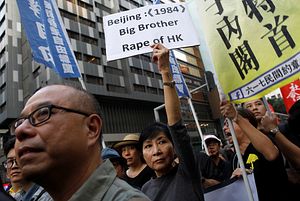China’s National People’s Congress Standing Committee has unanimously passed its interpretation of Article 104 of Hong Kong’s Basic Law, the “mini constitution” that forms the basis of “one country, two systems.”
The interpretation marks just the fifth time Beijing has used its power to interpret Hong Kong’s Basic Law, and preempted a judicial decision by Hong Kong’s own courts. The latest interpretation was meant to provide Beijing’s oversight to a controversy involving the oaths of two newly elected, pro-independence members of Hong Kong’s Legislative Council. Both legislators swore allegiance to the “Hong Kong nation” rather than the PRC during the oath, and pro-Beijing supporters have argued that they should thus be banned from assuming office.
Article 104 of the Basic Law states when assuming office, the chief executive, principal officials, members of the Executive Council and of the Legislative Council, judges of the courts at all levels and other members of the judiciary in the Hong Kong Special Administrative Region must, in accordance with law, swear to uphold the Basic Law of the Hong Kong Special Administrative Region of the People’s Republic of China and swear allegiance to the Hong Kong Special Administrative Region of the PRC.
The official interpretation of the article came in three parts.
1. Content of the oath
The ruling stipulates that it is a “statutory requirement and condition” for people taking public office to take the oath as stated in the Basic Law. In particular, officials must:
“swear to uphold the Basic Law of the Hong Kong Special Administrative Region of the People’s Republic of China and swear allegiance to the Hong Kong Special Administrative Region of the People’s Republic of China”
2. Definition of “in accordance with law”
- If candidates do not take a valid oath accepted by law, or if one declines to swear in, that person cannot assume office, and therefore cannot exercise the duties and enjoy the privileges of public office.
- The oath taking must fulfill the statutory requirements in format and content. The candidate must take the oath sincerely, solemnly, and accurately. They must read out the phrase “uphold the Basic Law of the Hong Kong Special Administrative Region of the People’s Republic of China” and “bear allegiance to the Hong Kong Special Administrative Region of the People’s Republic of China.”
- If the oath taker refuses to take the oath, he or she shall be disqualified from assuming public office. One is deemed to have refused to take the oath – and subsequently have his or her oath invalidated – if he or she deliberately reads out an oath different from the statutory oath or does it in an insincere or frivolous manner.
- The oath administrator has the duty to confirm the oath taking is carried out in accordance with the law and that the oath complies with this interpretation and Hong Kong law.
Any oath that does not satisfy this interpretation shall be confirmed as “invalid.” Retaking the oath is forbidden.
3. Consequences of a breach
The oath is legally binding. Those who take the oath must genuinely believe it and be legally bound by it. Those who make a “false oath,” or engage in behavior contrary to the oath, will bear legal responsibility.
Violent scenes once again gripped the streets of Hong Kong as citizens again took to the streets in the lead-up to China’s interpretation. In what was initially a peaceful rally in protest of Beijing’s decision to reinterpret Article 104, as many as 13,000 people marched against Beijing’s unilateral decision to step into the fray over whether the two pro-independence legislators should be allowed to take their seats in the city’s legislature. Protesters objected to Beijing’s decision to step in even as Hong Kong’s judiciary was reviewing the oath-taking incident.
Protesters ended an hours-long standoff with police outside China’s Liaison Office early on Monday, following clashes with officers. Pepper spray was deployed against the largely peaceful protesters. Two were arrested and several injured, including police officers.

































